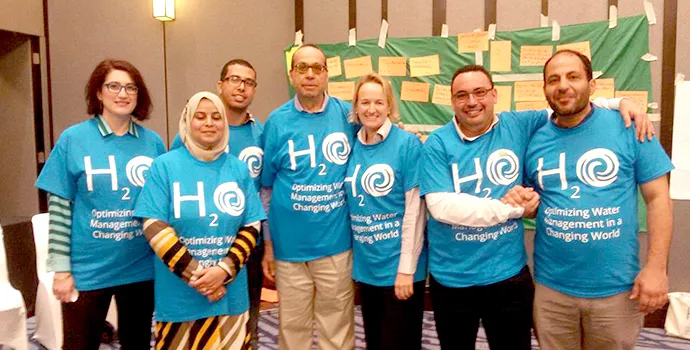ICBA scientist wins award for irrigated agriculture research
10 November 2015
Dr. Makram Belhaj Fraj, a senior scientist at the International Center for Biosaline Agriculture (ICBA), has received an award for his research on real-time monitoring systems for irrigated agriculture.
He was presented the award in the category “The most interesting project” during the first congress by the Middle East and North Africa (MENA) Network for Water Centers of Excellence on November 9, 2015, in Muscat, Oman, for the project ‘Application in real-time monitoring systems for irrigated agriculture’.
The project is a collective effort that involved ICBA in the UAE, the National Center for Agricultural Research in Jordan, Sultan Qaboos University in Oman, and the National Institute of Research for Rural Engineering, Water and Forestry in Tunisia.
The project aims at improving irrigated production systems to combat water scarcity which is anticipated to worsen over the coming years. To do that, researchers deployed technology in the form of sensor systems to get near-real-time remote monitoring of water and its flow in soils and through plants and to transmit data and information wirelessly. Usually, farmers depend on the feel of soil and clarity of the sky to decide on irrigation.
This study, however, generates accurate information that helps decision-makers implement sound policies and better manage the existing water resources. Commenting on this important achievement, Dr. Belhaj Fraj, said: “This project is an interesting example of field research involving scientists and the private sector: instrumentation manufacturers and agribusinesses. State-of-the-art instrumentation was tested on technology platforms in over 11 agro-ecological zones encompassing seven climates, ranging from desert to sub-humid and 10 soil classes.”
“Furthermore, the technology has been deployed in real production situations involving 28 plots in 16 agribusinesses that represent 2,500 ha of staple and annual and perennial cash crops,” he added.
As a result of this work, guidelines will be developed in close cooperation with local NGOs and agricultural extension services for capacity building of the farmers for the maintenance of a high tech system.











